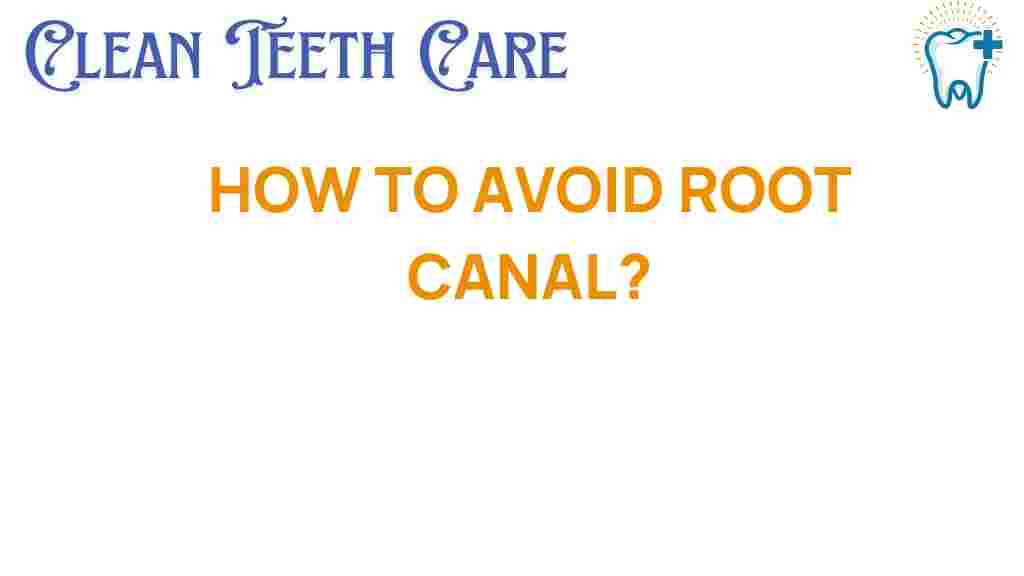Secrets to Avoiding a Root Canal: Essential Tips Revealed
Root canals are often dreaded by many, but they can be avoided with proper dental health practices. Understanding how tooth decay progresses and the importance of oral hygiene can help you maintain a healthy mouth and prevent the need for invasive procedures like a root canal. In this article, we will explore essential tips for keeping your teeth and gums healthy, preventing tooth decay, and ultimately avoiding a root canal.
Understanding Root Canals and Their Causes
A root canal is a dental procedure used to treat infection or damage within the pulp of a tooth. The pulp is the innermost part, containing nerves, blood vessels, and connective tissue. When bacteria invade this area, usually due to tooth decay or trauma, a root canal is often necessary to save the tooth.
Some common causes of root canal treatment include:
- Severe tooth decay: This is the most common cause, where bacteria penetrate deep into the tooth.
- Cracked or chipped teeth: A fracture can expose the pulp to bacteria.
- Repeated dental procedures: Multiple treatments on the same tooth can weaken it.
- Gum disease: Infections in the gums can contribute to pulp damage.
Essential Tips for Dental Health and Prevention
To avoid a root canal, it is crucial to adopt effective dental health practices. Here are some essential tips:
1. Maintain Good Oral Hygiene
Good oral hygiene is the foundation of dental health. Brush your teeth at least twice a day and floss daily to remove plaque and food particles between your teeth. Here are some tips:
- Use a fluoride toothpaste to strengthen tooth enamel.
- Brush for at least two minutes, ensuring you cover all surfaces of each tooth.
- Replace your toothbrush every three to four months, or sooner if the bristles are frayed.
2. Regular Dental Check-ups
Visiting your dentist regularly for check-ups and cleanings is vital for preventing tooth decay and gum disease. Dental professionals can identify issues early before they require treatments like root canals. Aim for at least two visits per year.
3. Limit Sugary Foods and Drinks
Sugar is a primary contributor to tooth decay. Bacteria in your mouth feed on sugar and produce acids that can erode tooth enamel. To protect your teeth:
- Limit sugary snacks and beverages, especially sodas and candies.
- Opt for healthier snacks like fruits, vegetables, and nuts.
4. Drink Plenty of Water
Staying hydrated is essential for maintaining good oral health. Water helps wash away food particles and bacteria, reducing the risk of decay. Additionally, fluoridated water can provide extra protection against cavities.
5. Use Mouthwash
Antimicrobial mouthwash can help reduce plaque and prevent gum disease. Look for products that contain fluoride or have been approved by dental associations for added protection.
Understanding Tooth Decay and Its Prevention
Tooth decay is a gradual process that can lead to serious dental issues if not addressed. Here’s how to prevent it:
1. Recognize the Early Signs
Being aware of the early signs of tooth decay can help you take action before it worsens:
- Tooth sensitivity to hot or cold.
- Visible holes or pits in your teeth.
- Discoloration or staining on the surface of the teeth.
2. Sealants for Extra Protection
Dental sealants are a protective coating applied to the chewing surfaces of back teeth. They provide a barrier against decay-causing bacteria and can significantly reduce the risk of cavities. Talk to your dentist about whether sealants are right for you or your children.
Enhancing Gum Health
Healthy gums are crucial for overall oral health. Neglecting gum health can lead to periodontal disease, which can increase the risk of needing a root canal. Here are some tips:
- Brush your gums gently while brushing your teeth to promote circulation.
- Floss properly to remove plaque and food debris from between teeth and below the gum line.
- Consider using a gum health mouthwash.
Dentist Advice for Preventing Root Canals
Following your dentist’s advice is essential for maintaining optimal dental health. Here are some common recommendations:
- Stay up to date with your vaccinations, which can affect your oral health.
- Discuss any medications you are taking that may impact your dental health.
- Ask your dentist about dietary changes that can improve your oral health.
Step-by-Step Process for At-Home Dental Care
Implementing a reliable at-home dental care routine is vital. Follow these steps:
- Brush: Brush your teeth with fluoride toothpaste for two minutes, twice daily.
- Floss: Floss daily to remove plaque from areas your toothbrush can’t reach.
- Rinse: Use an antimicrobial mouthwash to reduce plaque.
- Check: Regularly examine your mouth for any signs of decay or gum disease.
- Visit: Schedule routine dental check-ups every six months.
Troubleshooting Common Dental Issues
If you experience any dental issues, here are some troubleshooting tips:
- If you notice sensitivity, try using toothpaste designed for sensitive teeth.
- If you have bleeding gums, improve your brushing and flossing technique.
- For persistent bad breath, ensure you are cleaning your tongue and consider using mouthwash.
Conclusion
Protecting your teeth from decay is not only essential for avoiding a root canal but also for maintaining your overall health. By following these essential tips for dental health, prevention, and oral hygiene, you can significantly reduce your risk of tooth decay and gum disease.
Regular dental visits and practicing good oral habits are the keys to long-lasting dental health. Remember, prevention is always better than cure. If you have any concerns about your dental health, don’t hesitate to seek professional advice. For more information on effective dental care, check out this external resource.
This article is in the category Prevention and created by CleanTeethCare Team
